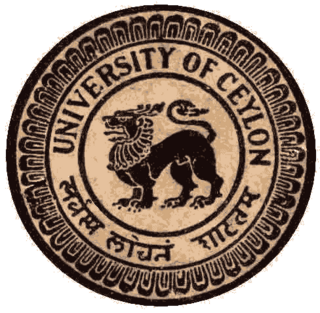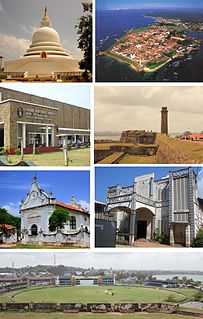
.

The University of Moratuwa, located on the bank of the Bolgoda Lake in Katubedda, Moratuwa is the most sought after technological university in Sri Lanka. Apart from academics including undergraduate and postgraduate studies, the University of Moratuwa presents social and cultural activities, student services, societies, and sports and recreational activities. The institution was known as Ceylon College of Technology, Katubedda before gaining university status. Its roots go back to the Institute of Practical Technology founded in 1960 to provide technical education.
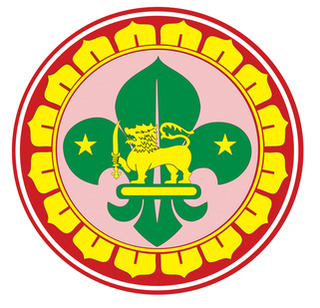
The Sri Lanka Scout Association, is a Scouting organization in Sri Lanka operated by the Ceylon Scout Council. The Ceylon Scout Council is a corporation formed by Act No 13 of 1957. The association became a member of the World Organization of the Scout Movement in 1953. The coeducational Sri Lanka Scout Association has 33,709 members as of 2014. in 2016 the year that the National Organization reached 104 years the Scouting Population in Sri Lanka had increased to 55,078 the growth taking place against the year 2015 was 29% which was a great achievement by the SLSA.

Education in Sri Lanka has a long history that dates back two millennia. The Constitution of Sri Lanka provides free education as a fundamental right. Sri Lanka's population had an adult literacy rate of 96.3% in 2015, which is above average by world and regional standards.Computer literacy in 2017 28.3% and phone users in 2017 105%, website users 32% in 2017 Education plays a major part in the life and culture of the country and dates back to 543 BC. Sri Lanka's modern educational system was brought about by its integration into the British Empire in the 19th century. Education currently falls under the control of both the Central Government and the Provincial Councils, with some responsibilities lying with the Central Government and the Provincial Council having autonomy for others.

The Church of Ceylon is the Anglican Church in Sri Lanka, as an extra-provincial diocese of the Archbishop of Canterbury. It was established with the appointment of its first Bishop, James Chapman in 1845 as the Bishop of Colombo. Until 1950 it consisted only of the Diocese of Colombo but a second diocese was established at Kurunegala in that year.

The University of Jaffna is a public university in the city of Jaffna in Sri Lanka. Established in 1974 as the sixth campus of the University of Sri Lanka, it became an independent, autonomous university in 1979. Like all public universities in Sri Lanka, UoJ receives the bulk of its funding from the University Grants Commission (UGC), part of the Ministry of Higher Education in Colombo. The UGC and the central government therefore exert a great deal of control over the university.
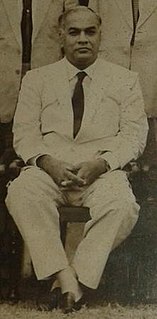
Bamunusinghearachchige Don Rampala, MBE was Chief Mechanical Engineer and later general manager of Sri Lanka Railways. He was the first native Sri Lankan to hold the post of Chief Mechanical Engineer. In 1956, the Institution of Locomotive Engineers in London recognised Rampala as the finest diesel engineer in Asia at the time.
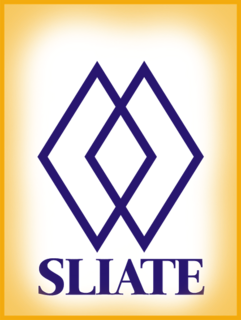
The Sri Lanka Institute of Advanced Technological Education is a statutory body in Sri Lanka coming under the purview of the Higher Education Ministry and offering Higher National Diploma courses. At present, it manages and supervises twelve provincial Advanced Technological Institutes throughout the island. The Institute is traditionally known for its education in the accountancy and engineering. As per the recommendations of the Committee appointed by Prof. Wiswa Waranapala, Deputy Minister of Higher Education in 1994, the Sri Lanka Institute of Advanced Technical Education (SLIATE) was formed in 1995, under the Sri Lanka Institute of Advanced Technical Education Act No. 29 of 1995. In 2001 the name of the institution was amended as Sri Lanka Institute of Advanced Technological Education (SLIATE).

The Methodist Church of Sri Lanka and in is a Protestant Christian denomination in Sri Lanka. Its Headquarters is in Colombo and was established on 29 June 1814. It is a member of the World Council of Churches, the Christian Conference of Asia, the National Christian Council of Sri Lanka and the World Methodist Council.

The ICBT Campus, popularly known as the International College of Business and Technology is a BOI approved project formed to conduct internationally recognized educational programs in association with educational institutes.
Tikiri Banda 'T. B.' Werapitiya was a Sri Lankan police officer and a politician. He was the former Minister of Internal Security.

Velupillai Suppiah Thurairajah was a Sri Lankan Tamil architect who designed many buildings in Sri Lanka and abroad.
Engineering is the most sought after subject areas among Sri Lankan students. The engineering degrees make up less than 2% of the bachelor's degrees in Sri Lanka.






